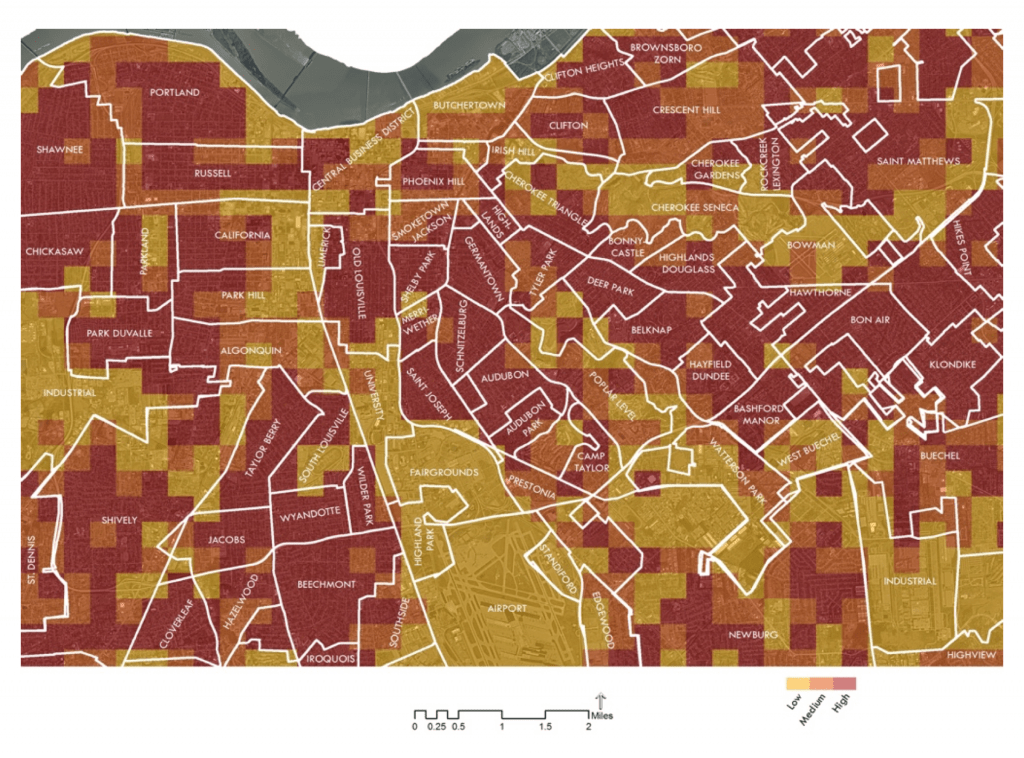Atlanta Climate Vulnerability Map
The Urban Climate Lab worked with the City of Atlanta to create a climate vulnerability map for all neighborhoods in the city — the first of its kind for a US city. Using the interactive map, residents can search for their neighborhood to see how it ranks in comparison to the other 247 neighborhoods in the city. Residents can also zoom down to the level of individual city blocks to see how their location compares to others in the city. Map colors correspond to the average daily high temperature in July (°F). Click on the button in the top right corner of the map to access the temperature range for each color class.
Climate risk statistics can be accessed by clicking on any neighborhood. All neighborhoods are ranked by heat risk, flood risk, and overall climate vulnerability (with lower numbers indicating higher risk). Additional statistics include the typical daily high temperature in July, the percentage of neighborhood homes with air conditioning, the neighborhood tree canopy coverage percentage, the number of trees needed to reach 50% tree canopy coverage (a goal adopted by the City Council), and how neighborhood heat risk would change if a goal of 50% tree canopy coverage was achieved.
Neighborhood statistics include the relative heat-related mortality of the neighborhood compared to the median mortality rate for the city. This metric is calculated as the percentage difference between the median mortality rate (deaths per 100,000 residents) for the city and that of the neighborhood of interest. Reported neighborhood statistics also include the heat island intensity experienced in the neighborhood. This metric is calculated as the difference in the maximum July temperature in the neighborhood minus the maximum July temperature in the coolest neighborhood in the city. For example, a heat island intensity of 6 would indicate that the average maximum temperature for the neighborhood is 6°F warmer than that of the coolest neighborhood. An overview of this climate risk resource can be found in the Atlanta-Journal Constitution.
Louisville Heat Analysis
Exposure to extreme heat is the leading weather-related cause of death in the United States, with more than 10,000 Americans succumbing to heat exposure each year. The Urban Climate Lab is partnering with large cities to answer two questions related to a the rapidly increasing risk of heat. First, what neighborhoods are most at risk to heat illness? And, second, what climate adaptation strategies are most effective in reducing heat exposure and saving lives?
Through the use of high resolution urban climate modeling tools, the UCL can map heat risk at the neighborhood level. As illustrated in this map, both the level of heat exposure over the course of a hot summer and the resulting number of heat fatalities can be estimated for each urban neighborhood in Louisville, Kentucky – one of the most rapidly warming cities in the United States. Our work in Louisville and other large cities finds that the number of heat deaths each year could be substantially reduced through extensive tree planting and the use of reflective “cool” roofing on buildings. Our heat risk and health work has been featured in The New Yorker and The Guardian.
